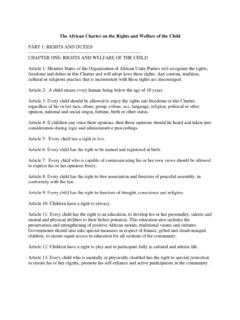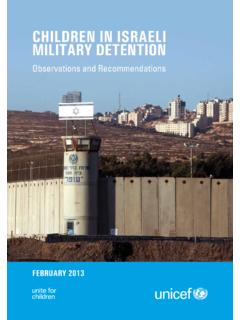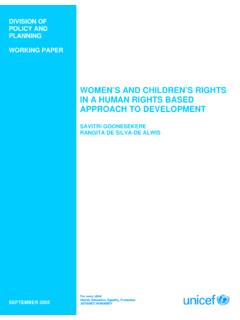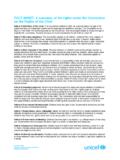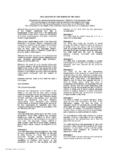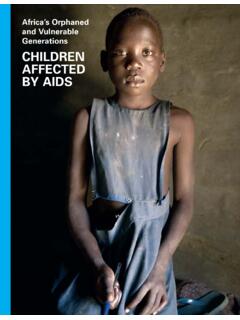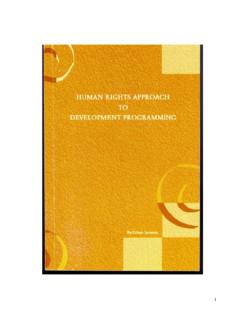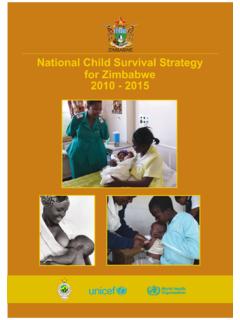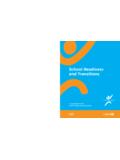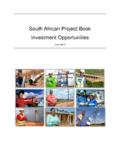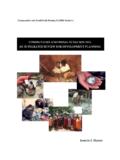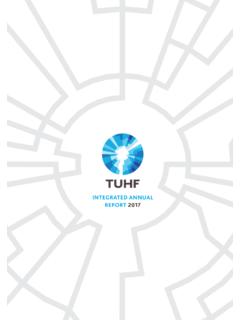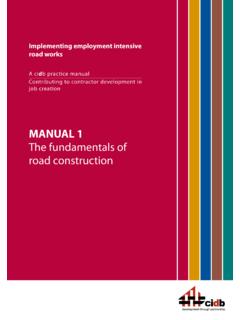Transcription of CIGI Special Report Climate Change in Africa - …
1 Edited by Hany Besada and Nelson K. SewankamboCIGI Special ReportClimate Change in Africa :Adaptation, Mitigation and Governance ChallengesThe opinions expressed in this Report are those of the authors and do not necessarily reflect the views of The Centre for International Governance Innovation or its Board of Directors and/or Board of 2009 The Centre for International Governance Innovation ( cigi ). This work was car-ried out with the support of The Centre for International Governance Innovation ( cigi ), Waterloo, Ontario, Canada ( ). This work is licensed under a Creative Commons Attribution Non-commercial No Derivatives License. To view this license, visit ( by-nc- ). For re-use or distribution, please include this copyright Special Report : Climate Change in Africa : Adaptation, Mitigation and Governance ChallengesEdited by Hany Besada and Nelson SewankamboTable of ContentsForeword | John English 7 Overview: The Current Climate Change Situation in Africa | Franklyn Lisk 8 Climate Change and Health: An Issue with Great Potential for Exacerbating Health Inequities in Africa | Nelson Sewankambo 16 Climate Change and Food Security in Africa | John David Kabasa and Irene Sage 21 Climate Change and Conflict in Africa | Dennis G.
2 Willms and Karolina Werner 26 Climate Change and Migration: Effects and Adaptation Mechanisms in Africa | Christopher Garimoi Orach 31 Climate Change and Energy in Africa | James Baanabe Isingoma 36 Greening the Gap: How Investing in Technology Access and Education Can Help Africa Cope with Climate Change | Erica Dybenko 41 Contributors 46 The Centre for International Governance Change in Africa : Adaptation, Mitigation and Governance ChallengesForewordThis African Initiative Special Report presents the fruits of early research in a major collaborative project involving Canadian and African researchers. The Centre for Inter-national Governance Innovation ( cigi ) based in Waterloo, Ontario, Canada; the Salama SHIELD Foundation (SSF), which is also Waterloo Region based; and Makerere Uni-versity in Kampala, Uganda, have created a major research program on the subject of the impact of Climate Change in Africa . This initiative brings together leading African aca-demics, a Canadian think tank, and a non-governmental organization with extensive African experience.
3 The papers in this book reflect the diversity and ambition of the organizing the project, we have selected particular ar-eas of focus: conflict prevention and resolution; migration; energy; health; and food security. These topics are reflect-ed very well in the briefing papers in this Report . One par-ticularly interesting aspect of the African Initiative is the creation of an African Portal, a joint project of Makerere, cigi and the South African Institute of International Af-fairs. Other partners throughout Africa are contributing content which will make the portal an important research and public policy instrument. As the paper Greening the Gap demonstrates, the rapid growth of mobile phone technology throughout Africa offers opportunities for the dissemination of information that is critical for the mitiga-tion of and adaptation to Climate Change in Africa . Our project has a strong research component, which is re-flected well in the papers. The multidisciplinary approach is obvious and, I believe, enhances significantly the contri-bution of the papers to public debate and policymaking.
4 Climate Change will affect Africa profoundly, but the con-tinent lacks the resources of the developed world to cope with its effects. Through research, public education and policy analysis, the African Initiative hopes to contribute to a successful African response to the enormous challenge which Climate Change English Executive Director, cigi Chair, The Africa InitiativeAbout the African Initiative T he African Initiative was launched on July 8, 2008. It is a partnership between cigi and the Salama SHIELD Foun-dation in collaboration with Makerere University in Uganda. The five-year program explores the impacts of Climate Change on Africa s socioeconomic status and security development within five areas: health, migration, energy, food security, and conflict resolution and mediation. The program combines field-based research, practical experi-ence, and teaching and education initiatives. The program s goals are to devise strategies to increase Africa s resilience to Climate Change and to develop sus-tainable practices.
5 A student/faculty exchange program will bring Africans to study at academic institutions in Ontario, Canada, and enable Canadians to study at academic institutions in Africa . The African Initiative Congress on Climate Change (AICCC) will be held November 1-4, 2009, in Centre for International Governance Innovation8 : The Current Climate Change Situation in AfricaFranklyn LiskBackground: Africa and the Global Response to Climate ChangeAbout a quarter of the 192 parties to the United Nations Framework Convention on Climate Change (UNFCCC) that will gather at Copenhagen in December 2009 to try to reach agreement on global action to combat cli-mate Change for the period after 2012 successor to the Kyoto Protocol will come from Africa . What is Africa s interest in this global effort to meet key Climate Change objectives? How will Africa perform in Copen-hagen? Will Africa make a difference to the outcomes of the negotiations and the Copenhagen Agreement, given its passive role in Kyoto?
6 Most analyses of the impacts of Climate Change that have influenced UNFCCC agreements focus on me-dium- to long-term projections of carbon emissions and forecasting models of global warming, and cover mainly countries and regions for which relevant data are readily available. This leaves out most develop-ing countries and regions, particularly Africa , due to unavailable data and trajectories. From an African perspective, this omission is serious and costly. As the poorest continent, Africa is considered most suscep-tible to Climate Change due to its vulnerability and in-ability to cope with the physical, human and socio-economic consequences of Climate , existing adaptation mechanisms and resourc-es under the Kyoto agreement designed to mitigate cli-mate Change s effects on Africa (and other developing regions) have been directed at limiting future carbon emissions, rather than addressing the region s vulner-ability and lack of resilience to the impacts of Climate Change on its economies and populations.
7 As late as April 2007, a Report by the Intergovernmental Panel on Climate Change (IPCC) warned that Africa was not act-ing quickly enough to stem the dire economic and en-vironmental consequences of greenhouse gas emissions (IPCC, 2007). What this Report seemed to have missed or overlooked is that Africa s concern about Climate Change is not mainly in terms projections of carbon emission and future environmental damages. It is more about the links between Climate Change and droughts, desertification, floods, coastal storms, soil erosion contemporary di-saster events that threaten lives and livelihoods, and hin-der the continent s economic growth and social to the limited relevance of past and current glob-al Climate Change agreements to Africa s Climate and environmental problems, the hardest hit region has benefited least from the international Climate Change regime, which relates almost exclusively to funding and investments for green, low carbon growth. For example, Africa s participation to date in the Clean Development Mechanism (CDM) and carbon trad-ing arrangements under the Kyoto Protocol has been Africa s negligible role in previous interna-1 U nder the Kyoto Protocol, the CDM allows countries to gain green- Change in Africa : Adaptation, Mitigation and Governance Challengestional Climate Change negotiations can be remedied by concerted action on the part of African leaders in the Copenhagen round of has much at stake.
8 The key question is: how can Africa make a Copenhagen deal relevant to the impact of Climate Change on its economies and populations? To address this question, we need to explore the link between Climate Change and socioeconomic condi-tions that intensify underdevelopment and poverty in Africa , and examine the different pathways through which Climate Change affects Africa s development. We also need to highlight the opportunity that Copen-hagen can create for Africa to adapt to new, more ef-ficient patterns of development that reduce its vulner-ability and improve its gas emission reduction credits by investing in projects to protect the environment. The idea is that developing countries, which are mi-nor environmental polluters, could benefit from such projects through foreign investment and technology transfer from developed countries, which are the biggest polluters. The CDM, which has developed into a US$ billion market, has, unfortunately, not fulfilled its potential for mobilizing development finance and technology transfer for Africa : only 4 percent of global CDM projects are in Africa , and of 40 CDM projects involving forests only four are in Africa and none have passed the registration stage.
9 See APP et al. (2009) for details on CDM rules and other existing carbon trading arrangements as they affect Africa and proposals for of Climate Change on Africa s DevelopmentClimate Change is already a reality in Africa . There are prolonged and intensified droughts in eastern Africa ; unprecedented floods in western Africa ; depletion of rain forests in equatorial Africa ; and an increase in ocean acidity around Africa s southern coast. Vastly altered weather patterns and Climate extremes threaten agri-cultural production and food security, health, water and energy security, which in turn undermine Africa s abil-ity to grow and develop. Climate and environmentally related disasters which threaten human security can in-duce forced migration and produce competition among communities and nations for water and basic needs re-sources, with potential negative consequences for politi-cal stability and conflict resolution.(i) Pathways through which Climate Change and Development InteractAgriculture and food security: Agriculture, which pro-vides a livelihood for about three-quarters of Africa s population, is mainly rain-fed.
10 Severe and prolonged droughts, flooding and loss of arable land due to deserti-fication and soil erosion are reducing agricultural yields and causing crop failure and loss of livestock, which endangers rural and pastoralist populations. The Horn of Africa s pastoralist areas (Ethiopia-Kenya-Somalia border) have been severely hit by recurrent droughts; livestock losses have plunged approximately 11 million people dependent on livestock for their livelihoods into a crisis and triggered mass migration of pastoralists out of drought-affected areas. Climate Change is also con-tributing to oceanic acidification and an increase in sur-face water temperatures around the African continent, The Centre for International Governance Innovation10 affecting fish stocks and threatening the live-lihood of coastal and small-scale fishing The impacts of Climate Change on agriculture and other key economic sectors in the food production and supply chain, such as forestry and energy, threaten food security across sub-Saharan : Increases in temperature, Climate Change -in-duced natural disasters and scarcity of safe drinking wa-ter due to droughts are major contributors to the spread of infectious and water-borne communicable diseases in Africa .

